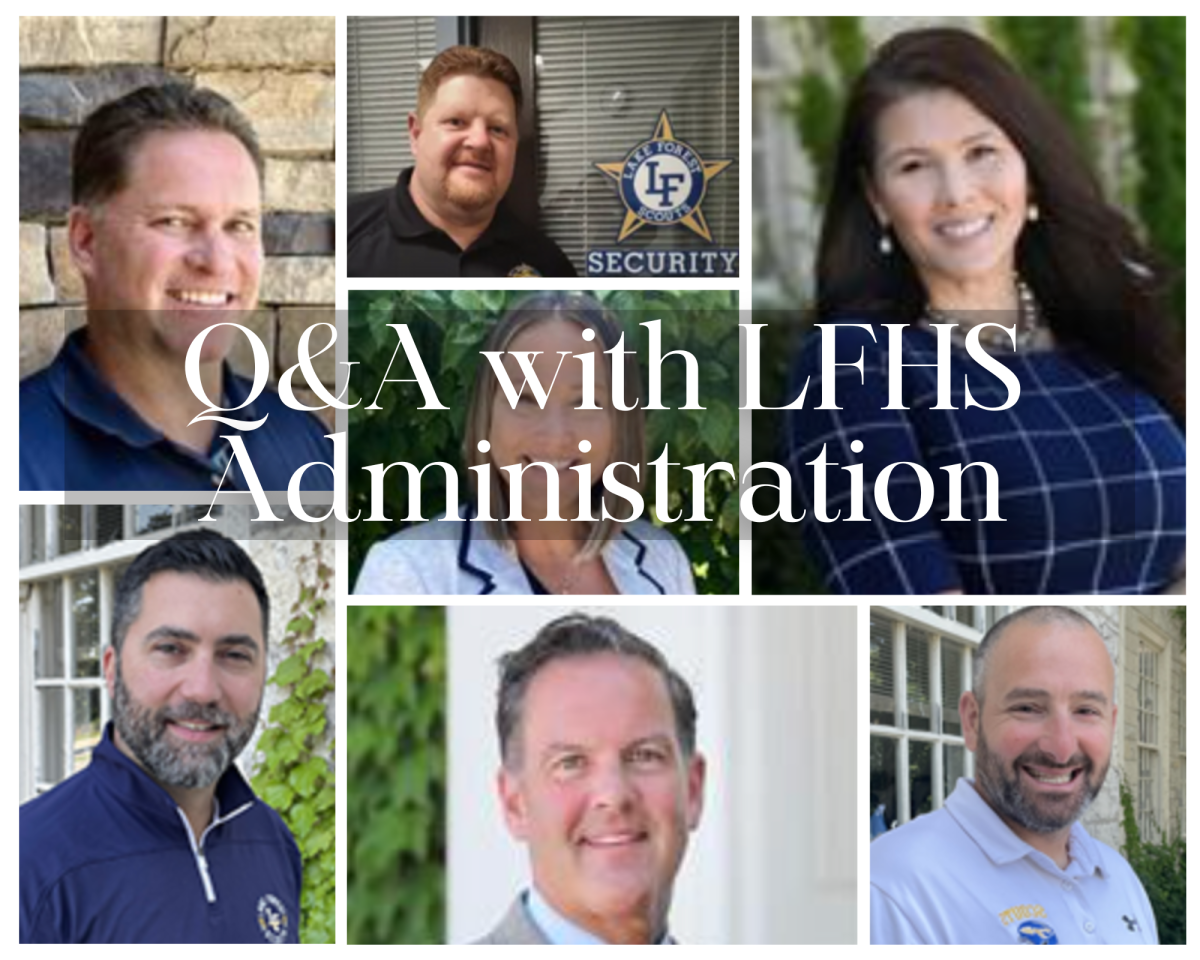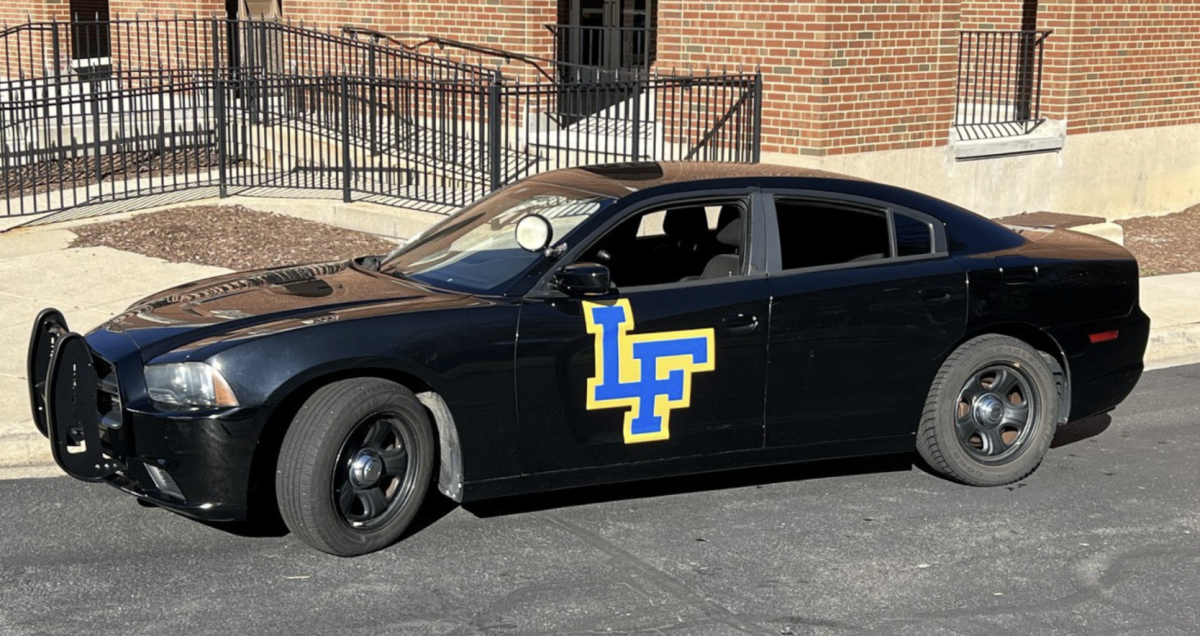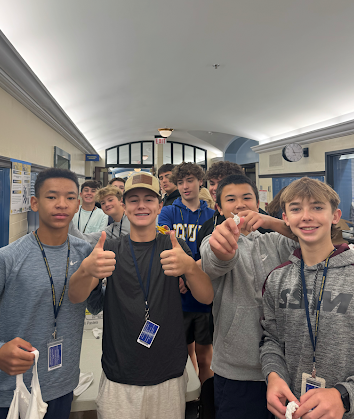Students at Lake Forest High School are familiar with the teachers in their classrooms, the deans sitting in the lunchroom, and the people working in the cafeteria each day. They’re often too focused on their own schedules to realize just how much goes on behind the scenes. There are so many administrators in the community who have significant roles that students don’t recognize, and they work hard every day to ensure that this school is the best place to learn.
Dr. Lenart, the school’s principal, is constantly thinking about all aspects of the community. As a former teacher at another district, she says that the difference between being a teacher and a principal is that she used to be in control of the day, but now her days consist of “what will happen to her.”

Q: What does it mean to be the principal at LFHS?
A: “I am always thinking about the community and the extraordinary needs of each department. I’m an administrator over instructional directors, including English, math, science, social studies, health and wellness, etc. There are so many roles that need to be filled in such a small community, so my colleagues and I have to take on multiple roles. I meet with department chairs, participate in board and policy meetings, and have various appointments with students, safety and security, and the deans if there are problems. Outside of the school district, I am thinking about IHSA, which has a wider landscape than just what’s going on within the school.”
Q: What aspects of your job might students not know about?
A: “My daily schedule is always changing and is never the same. Today, I had multiple meetings, phone calls, appointments, and an important email to send out. My job is so fun; I feel like I’m living the dream. My day is filled with tons of micro-decisions, and I have to make them in a split second. Even if I want to focus on one task, that can’t always happen because something else comes up. Working at the school is like problem-solving all together, and the team I work with is truly a collaboration where we all learn every day.”
Q: How do you communicate different issues with the other administrators?
A: “There are so many people that I work with on a daily basis, including various administrators and department chairs. There are several people on the leadership team. People like the tech crew, the support staff, building supervisors, bus drivers, and custodians are all so important to students’ day-to-day lives, and they have a lot of value in their work. It takes all of us to keep the community strong, and we are all trying to work to make sure everything runs smoothly for everyone.” Dr. Sassen is the associate principal at the school, and he supports the work of many administrators and partners with many different groups around the school and community, which allows him to make many connections.
Dr. Sassen is the associate principal at the school, and he supports the work of many administrators, and partners with many different groups around the school and community, which allows him to make many connections.

Q: What does being an associate principal at Lake Forest High School mean?
A: As the Associate Principal, Sassen supports the work of many administrators, and “this support includes the evaluation of administrators, teachers, and support staff, managing the budget of each department, and supporting curriculum and staffing within each department.” Additionally, he supports Ms. Sadoski and Ms. Kudla’s work in health services.
Q: What is your role in the administration, and how does it impact the entire community?
A: Sassen oversees the staffing and registration processes in February and March. He says that “when students register for classes, we then need to determine the staffing that is needed to run those classes. I partner with Counselors and administrators to recommend staffing to Dr. Montgomery, our Superintendent.” He is also responsible for building the Master Schedule, in partnership with Counselors and departmental administrators, for the following school year once registration is complete. Sassen partners with various stakeholders in planning and implementing open houses, parent-teacher conferences, The Scout Experience, and graduation. He also supports Dr. Lenart in myriad building-wide responsibilities, including leadership team initiatives, staff committee representation, and parent community
Q: What do you do behind the scenes that not many students know about?
A: “My role allows me multiple opportunities for community connections, which I thoroughly enjoy,” Sassen said. He partners with Mrs. Walsh, the Administrative Assistant for Educational Services, and the APT on implementing our Career Connections programming, consisting of the Alumni Panel, Open Doors, Professional Seminars, Summer Internship and Job Opportunities Fair, and Career Pathways planning. He also partners with the LEAD adolescent substance prevention coalition and the LFHS Alumni group. He’s a member of the Community Wellness Task Force, which is “working to bring as many protective factors to the adolescents who live in our communities as possible in partnership with Districts 65 & 67 and other community partners.”
Mr. Lesniak, assistant principal of student operations, was a special education teacher for 11 years and a dean for 13 years at Lake Forest before taking this new position. In his first year as assistant principal, he looked into the future of operations rather than the day-to-day tasks. Though the adjustment from daily student interactions to taking a step back from that role took some time, Lesniak enjoys being at school events and spending time in the cafeteria to stay involved with the students.

Q: What does it mean to be the assistant principal of the students at Lake Forest High School?
A: [It] means doing things on the operation level, like testing in the building for AP exams, the ACT, or the SAT. I’m also in charge of the textbooks and Macbook distribution. I have to look into the future to make changes within the system for upcoming years, like making the PSAT digital and experiencing the benefits and drawbacks of that. I oversee the day-to-day operations as well as future operations, so I’m planning for those events that seem so far in the future. I partner with a lot of people to do all of this, and none of it is by myself.
Q: What are some important factors in your job that students might not know about?
A: “Being an assistant principal rather than a dean has taken me away from the kids a bit, but I still have the ability to go hang out in the cafeteria and stay involved. I get to consult with the deans on bigger issues at all of the school events (dances, graduation, etc.); it’s just a step back from the day-to-day interactions with kids. When there’s a bigger challenge for the deans, those issues come to me.”
Q: How do you work with the rest of the administration board to ensure things run smoothly each day?
A: “There are lots of meetings that occur on a weekly or biweekly basis: the operations team (extracurriculars), the instructional directors and department chairs (curriculum), and then the bigger picture meeting (strategic plans & vision). We get a pulse from the kids, see what teachers think, and share ideas as a baseline to go from there. We use distributive leadership to all work together, and we also use a leadership policy called SIIP (School Innovation and Improvement Plan), which is a group of administrators and teachers that get together to talk about things like ‘The Scout Way,’ the cell phone caddy, principles of respect, etc. We decide everything based on the feedback we get from our community.”
Mr. Linder is the director of school safety and security, and he works each day to maintain a safe environment for both students and staff in the building. He and a team work together with shared values, and he says that it doesn’t just take one person, but it takes an entire community to ensure a secure environment for learning.

Q: What does being the director of security and operations at LFHS mean?
A: “The primary responsibility is to ensure the safety of LFHS students and staff and maintain security during both school hours and after-school events. This is accomplished through planning and training with school staff and administrators on emergency response and crisis management and working with Student Services to support the social and emotional well-being of our students. We also partner with our School Resource Officer on issues that require collaboration with local law enforcement. On the operation’s side, the responsibilities involve short and long-term planning to achieve organizational objectives. A team meets on a weekly basis to review the building calendar… for day-to-day operations and special events.”
Q: What are some important factors in your job that students might not know about?
A: There is a direct connection between school safety and academic success. If students do not feel safe at school, it impacts their desire to attend school, as well as their ability to learn. Most of our team members are retired Police Officers with significant training and experience in law enforcement. We share a mutual passion for public safety. All of our students and staff members are stakeholders and have a role in ensuring the safety and security of their classmates and peers. If anyone sees or hears anything suspicious or concerning, they should report it in a timely manner. This can be accomplished through our Confidential Reporting Tool or just by speaking with a trusted staff member. We are all in this together!”
Q: How do you work with the rest of the board of administrators to make sure things run smoothly on a day-to-day basis?
A: With shared values and a common purpose, we function very well as a team. We are proactive in our approach to safety and have worked hard to establish a positive climate and culture at Lake Forest High School. This commitment to our school community ensures that LFHS runs smoothly on a daily basis.
Mr. Maher is the director of student services at LFHS, and he works closely with many different people and teams around the school. He worked with CROYA, is on the LEAD board, helps manage Social-Emotional Learning (SEL), and runs the 3 CORE teams.

Q: What does it mean to be the director of student services at LFHS?
A: “I supervise the school’s 7 Academic Counselors, 3 Social Workers, 3 Psychologists, 2 teachers that run our NET program, the Registrar, and 4 Assistants. A major part of the NET program is to help students who have missed a large amount of school catch up on their work and get support. I am the 504 Coordinator, and I run our 3 CORE teams (counselor, dean, SWer, Psych), who I meet with weekly to discuss any students that have been referred to the team. I also co-lead our threat assessment team. As far as community, I was the school representative on the CROYA adult board for 6 years, I have helped run the Community Wellness task force for 8 years and am still a member, and I am currently on the LEAD Board.”
Q: What are some important factors in your job behind the scenes that students might not know about?
A: Maher works with many families to “address questions or problem-solve situations.” He also works with instructional directors, deans, and other administrators and is in many 504 meetings to make sure the plans are reviewed. He “works closely with CROYA to help bring in peer training” and “works closely with LEAD to help secure programming…” He works with APT and is in charge of the annual walk, as well as the “smoking meats” event. He occasionally presents to the Board of Education.
Q: How do you work with other administrators to make sure things run smoothly?
A: “We have different weekly administrator meetings set up for the purpose of discussing different topics and also on how to continue to work to be a better team. We are in constant communication and have checks and balances for the things we are in charge of. Every administrator’s primary goal is to do what is best for kids.”
Ms. Malec, director of student activities and instructional and curricular director of music, art, and theater, is in charge of the clubs and activities at LFHS. It’s her 6th year in this position, and her main goal is to get students involved and engaged throughout the community because engagement in the community often results in academic success.
Q: What does it mean to be the director of student activities at LFHS? How would you describe your job?

A: “I’m in charge of all of the clubs in activities, as well as curricular activities in the community. There are 55 clubs and activities at the school, so there’s anything that anyone could want to participate in available. I’m also involved in organizing the dances, and am the boss of the advisors. If you’re looking for something to do, walk into my office and just ask.”
Q: What are some important factors in your job that students might not know about?
A: “There are a lot of financial needs that need to be considered that some students might not think about, especially for something like prom. If a student needs help covering a ticket or even something like getting an outfit, I make sure that they have access to it. I also have information on every single student, and I track the correlation between students who are involved and students who get good grades, and it’s usually a direct correlation. It’s important as a student to understand the importance of feeling connected to a community, especially as a freshman.”
Q: How do you work with the rest of the administration board to ensure things run smoothly each day?
A: “There are many different boards, between West campus, the curricular board, etc. Our main goal is to make sure that everyone in the school is taken care of and that there are at least 90 different people working together as sponsors, teachers, etc. It’s fun to see how the puzzle fits together.”
Mr. Nadler is the director of special education at LFHS, our school’s biggest department. This department serves over 200 students and is governed by federal laws.

Q: What does it mean to be the director of special education?
A: “Special education is the biggest department at our school, servicing 200+ students. There are students who receive service in every class, and it’s my job to put the programming in place, to meet compliance with all students who get services that they’re entitled to via their education plan (IEP – Individualized Education Program).” There are also department chairs, Mr. Kelly and Mrs. Debartolo, that I oversee to make sure that we are doing it right.”
Q: What are some crucial factors in your job that students might not know about?
A: “I deal with students in crisis, so if something comes up, I have to drop everything and focus on that. Threat assessments and risk assessments are also put into place to make sure everything is safe. It’s not just about education; it’s also about mental health, and as a department, we have to be there for the students. There’s a link between the home and the school to make sure that things are being taken care of.”
Q: How do you work with the rest of the administration board to ensure things run smoothly each day?
A: “I work with everyone, especially Dr. Lenart and Dr. Sassen. Special education has to work with every department – instructional directors, department chairs, etc. – to make sure that services in every classroom are being correctly followed. All aspects of the building are touched with special education. The environment in the cafeteria, the temperature of a classroom – everything is taken into consideration to make sure all students can fit into the school.”








